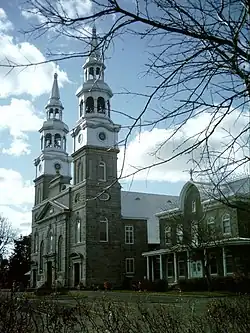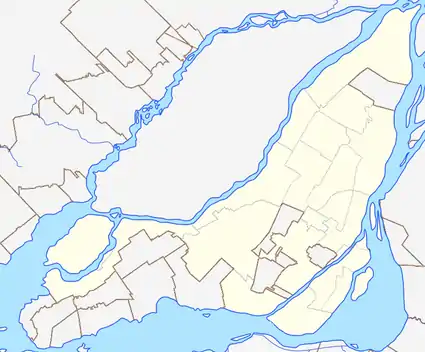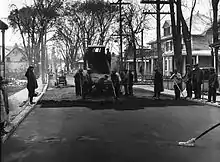Recollet Rapids | |
|---|---|
| Sault-au-Récollet | |
 | |
 Recollet Rapids Location of Sault-au-Récollet in Montreal | |
| Coordinates: 45°34′40″N 73°38′45″W / 45.57764°N 73.64582°W | |
| Country | Canada |
| Province | Quebec |
| City | Montreal |
| Borough | Ahuntsic-Cartierville |
| Postal Code | |
| Area code(s) | 514, 438 |
Sault-au-Récollet (English: Recollet Rapids) is a neighbourhood in Montreal. It is located in the eastern edge of the borough of Ahuntsic-Cartierville, bordering the Rivière des Prairies. Autoroute 19 connects Sault-au-Récollet to Laval. The neighbourhood was designated as a heritage site by the City of Montreal in 1992.[1] The Church of the Visitation at Sault-au-Récollet is the oldest church on the Island of Montreal and was built between 1749 and 1752. The streetcar suburb was annexed by Montreal to from the former borough of Ahuntsic-Bordeaux in 1918. A housing boom, mostly made up of multiplexes, followed in the 1940s and 1950s.
Fort Lorette
The Sulpician missionaries had been operating a mission to the indigenous peoples of the area at Fort de la Montagne for about 20 years when they decided to move to Sault-au-Récollet. Part of this decision was due to an increase in brandy trade and exposure to alcoholism, and part was to move the fort to a more easily defended section of the island. [2] In 1696, a flock of 210 Algonquins was moved to Fort Lorette under the guidance of Fr Robert Gay. [3]
Gallery
 In 1726
In 1726 1890
1890 1930
1930 An illustration of Fort de la Nouvelle-Lorette in 1672
An illustration of Fort de la Nouvelle-Lorette in 1672
See also
References
- ↑ "Neighbourhood Sault-au-Récollet - Discovery". NEIGHBOURHOODS AND SITES. Heritage Montreal. Retrieved 30 April 2012.
- ↑ Beaubien, Charles (1898). Le Sault-au-Récollet: ses rapports avec les premiers temps de la colonie (in French).
- ↑ Paradis, Jean-Marc (1969). "GAY, ROBERT-MICHEL". Dictionary of Canadian Biography, vol. 2. University of Toronto/Université Laval. Retrieved November 22, 2022.